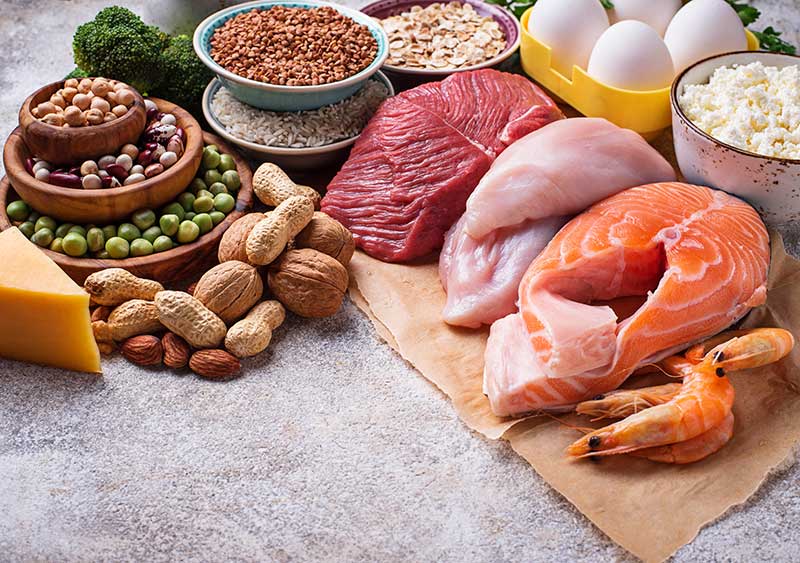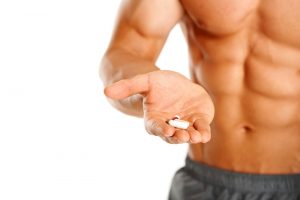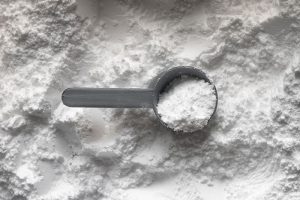A quick search online will deliver an array of protein pills, protein capsules and protein powders. Working out which option offers the best muscle support system can feel like a minefield. Is protein in pill form all it’s cracked up to be? Knowing which form of protein can offer you real results is the important thing here.
When the pros, cons and benefits are there for you to see – what is the real difference between them all?
Don’t worry, we’ve done the hard work for you. So let’s take a look at the best protein pills that’ll give you powerful results.
What are protein pills?

Protein in pill form has long been a go-to for bodybuilders and eager-exercisers. Protein capsules are typically used to boost protein synthesis and aid muscle recovery. Essentially, they’re a dietary supplement that is used to boost your protein intake.
By ensuring your body receives a decent level of protein, essential amino acids work to stimulate the natural development of muscle.
But how much protein do you need? While the quantity you take can vary according to the source, on average, for every pound of body weight you will need 0.36g of protein daily.
Sure, that sounds totally do-able. But it’s easy to get caught up in the idea of potential muscle growth. So we should probably mention the effectiveness of protein supplement pills only comes into action when paired with regular exercise.
When you think about it, it suddenly becomes pretty obvious. During weight training, the natural tearing of muscle fibers is what encourages muscle growth. As these muscle fibers heal and your body recovers – this is when you gain muscle. To support this cycle of muscle mass gains, your body needs support. This is where a protein pill is used to support protein synthesis.
Providing your body with enough protein and 9 essential amino acids isn’t easy, especially when you’re lifting a huge amount of weight. Your body requires these essential amino acids to boost protein creation, supporting muscle tissue.
It comes as no surprise that many bodybuilders turn to protein pill supplements to aid their gains. When you’re putting your body through intense exercise and heavier weight, it’s natural to need a higher protein intake.
The science behind it:
Dietary enzymes called proteases break protein down during digestion. The quicker this breakdown of protein happens, the faster they can be converted into amino acids. These amino acids then work to stimulate muscle growth and heal muscle tissue.
As well as benefiting muscle growth, extra protein can help strengthen your immune system – keeping you feeling fit, strong and healthy.
Where do these pills source this protein?

When you opt for protein pills, you’d be led to believe you’re getting a hefty boost of protein – right? In reality, the average protein capsule only contains around 2g of protein. If you compare a protein pill with protein powders – a powder will deliver (scoop size depending) between 20 – 25g of protein. Now that’s protein power.
Putting these two protein supplements side by side shows an obvious winner – protein powder. To receive the same intake of protein in powder form via protein pills, you’d be consuming a hell of a lot of protein capsules!
But doesn’t it make you curious as to what is in protein pills in the first place? What type of protein can you expect to find in protein supplement pills?
While this may vary between manufacturers, these capsules typically use whey or casein. Of course, you can give the likes of chicken, beef, eggs, liver or milk a try – but the reality is, they just aren’t so popular. If whey and casein protein pills were to go head to head, whey protein capsules would come out top.
But why? Put simply, it’s down to speed. While both are easily digested and absorbed into the body, whey appears in your bloodstream quicker. Whey protein pills also take the lead due to their more potent anabolic effect on muscle growth – which is down to its higher level of essential amino acid leucine.
If you’re still unsure which protein supplement pills to opt for, we recommend choosing a pill that delivers the most high quality protein. Don’t forget, a protein pill can’t give your body everything. For optimal muscle growth and repair, ensure you pair a protein pill with essential vitamins and minerals.
How to take protein pill supplements and what for
If you’re considering adding a protein pill into your routine, it’s important to take note that they are not a meal replacement. They are quite simply a supplement, intended to be paired with a healthy diet and regular exercise for maximum output.
Yes, they can supply you with all the essential amino acids needed to stimulate protein synthesis – but they can’t do it alone. Your body needs fuel in the form of nutrition, too.
Best taken at least 2 hours before you work out, this will allow your body enough time to absorb and digest this pill form of protein. Your body needs time to utilize the protein itself, so you can get pumped and feel ready to lift. There is also another way you can benefit.
Some users prefer to take a protein pill post-workout, to speed up recovery and muscle repair.
In the same way that protein capsules shouldn’t be used as a food replacement, they should also not be taken for weight loss. Of course, protein pill supplements can support your exercise momentum and recovery time, but they can’t force your body to gain muscle without exercise. Therefore, they can’t help you lose weight without exercise either.
The aim of the game is to increase your mass.
Should you take a protein pill or protein powder?
The question many keen bodybuilders ask: What is the difference between protein pills and powder?
As we mentioned already, the biggest difference is the level of protein you’re actually receiving.
Typically, protein pills will only deliver around 2g of protein per pill. That’s crazy when compared to one scoop of protein powder giving at least 20g of protein. Plant-based protein powders offer more protein than that found in a protein capsule. For example, pea protein contains 21g of protein for every 28g.
We already mentioned how matching protein powder’s protein quantity would result in popping protein pills all day. But that isn’t recommended either, as there is actually a dosage limit within a 24 hour time period. Taking a handful of 10 protein pills in one go is just not practical when you’d need to do this 2 times each day.
Don’t take that route. It’s more hassle than it’s worth. Especially when there are other things to consider.
Protein Powder vs Protein Pills: Similarities
- Protein powder and protein capsules are the same product, minus the quantity. Their aim is the same, to deliver protein. They just do it in different forms. One as a powder, and the other, a pill.
- Your body absorbs protein powders and protein capsules exactly the same. The casing used for capsules dissolves almost instantly, releasing protein in exactly the same way across pills and powders.
Protein Powder vs Protein Pills: Differences
- Protein powders are predominantly used during bulking cycles, with protein shakes containing extra calories. This helps you to gain weight during your bulk. Protein in pill form can’t offer these calories.
- When mixed with water, milk or fruit juice, protein shakes can be consumed as a meal replacement. Protein supplement pills, however, cannot.
- Protein pills are convenient and can be taken anywhere, with no prep involved. Protein powders require preparation, contains and the means to carry this prep with you if you’re out all day.
- Protein powders can get a little messy. Scooping the right amount, mixing and carrying it around with you could lead to spills if you’re not careful.
- Flavor doesn’t need to be considered if you opt for pills. Simply pop one in your mouth, swallow and you’re done. Some powders can taste bad or leave an aftertaste in your mouth.
Protein Powder and Protein Pills: Pros
- Both protein powders and protein pill supplements can easily be integrated into your bodybuilding cycle and at different stages. Saying this, it comes as no surprise that protein powders are popular for bulking as they contain extra calories.
- As well as boosting your protein, both have other positive health benefits. This includes reduced inflammation, lowered blood pressure, improved diabetes and immunity, raised antioxidant properties and the lowering of bad cholesterol levels.
- Protein powders can keep you feeling full and can be consumed as a meal replacement. Kick snacking to the curb!
Protein Powder and Protein Pills: Cons
- Protein in pill form offers less protein than your typical protein-rich foods – such as chicken, eggs, milk and fish. Plus, these foods have zero side effects of course.
- If you take too high a dosage of protein pills, they can overload your liver and cause long term damage. If you opt for whey protein, never take more than 30g in one serving.
- Overloading your body with protein pills and powders can lead to digestive issues, liver and kidney problems, pain, nausea, cramping, bloating and diarrhea. (No thank you!)
- Taking too much protein is counterproductive. Your body can only utilize a specific amount of protein at one time. Too much protein in one go will be wasted.
- Many bodybuilders consume a lot of protein through diet, making the addition of protein pills or supplements a little redundant when it comes to gaining more muscle.
When should you take protein?
These two products may appear very similar on the surface, but they most certainly benefit you in different ways.
If you’re looking for convenience and ease – opt for a protein pill. They are super convenient, easy to carry with you and easy to take. However, you may be waiting a little longer to see gains.
For a higher boost of protein in one dosage, protein powders should be your go-to. In one scoop alone you can experience 20 times the quantity of protein found in one tiny protein pill. It just makes sense, doesn’t it?
For the ultimate gains, you need more than a couple of grams to give your body power to repair and grow muscle. Protein pills simply can’t keep up.
To achieve real results, we recommend including plenty of protein-rich foods in your diet, such as meats, eggs and milk. As we mentioned previously, a protein powder or protein supplement pill should be considered an addition to your healthy diet and lifestyle.
To get the most out of your workouts and for serious gains, give our range of bulking products a try. Build STRENGTH, get SHREDDED and POWER up your workouts in no time.















